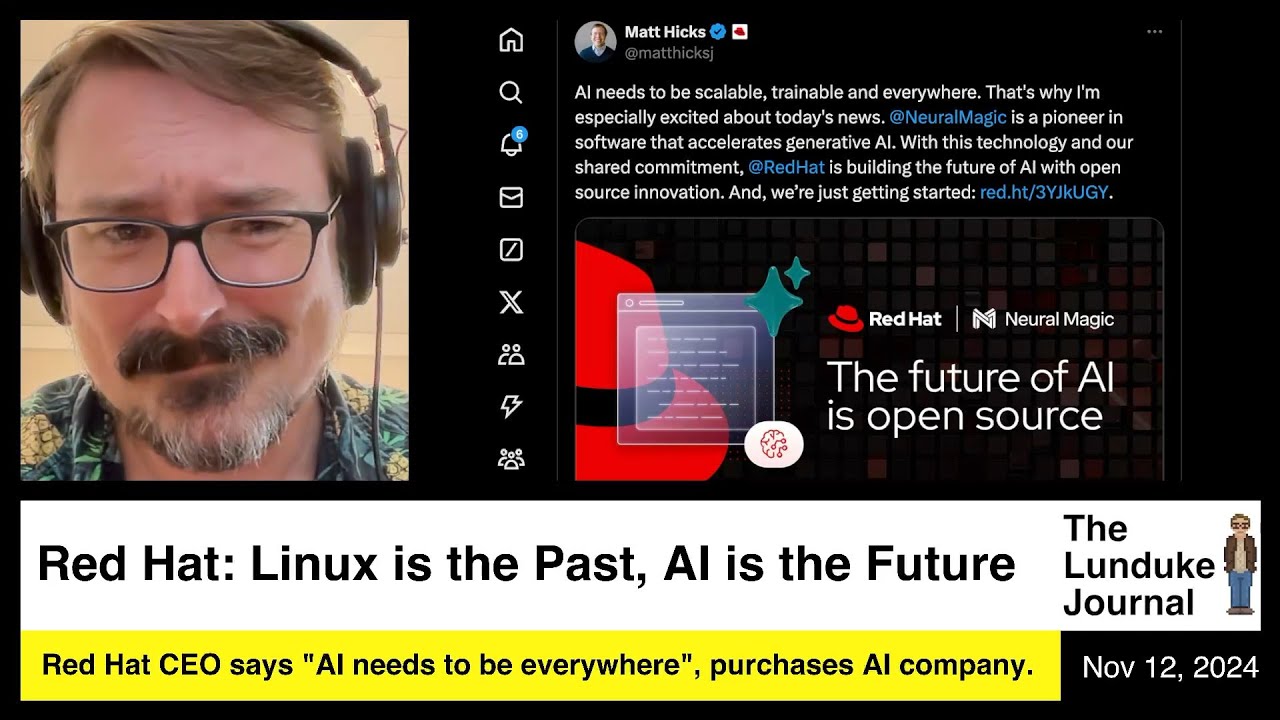The video discusses Red Hat’s strategic shift from its traditional Linux focus towards artificial intelligence (AI), highlighted by its acquisition of Neural Magic and a strong emphasis on AI at the 2024 Red Hat Summit. It critiques the concept of “open-source AI” as presented by Red Hat, suggesting a limited interpretation of openness, and raises concerns about the diminishing investment in Linux by both Red Hat and the Linux Foundation in favor of AI initiatives.
The video discusses the significant shift in focus among major Linux companies, particularly Red Hat, as they increasingly pivot towards artificial intelligence (AI) and away from their traditional Linux roots. The acquisition of Neural Magic, an AI company, by Red Hat is highlighted as a key example of this trend. Brian Stevens, the CEO of Neural Magic, expressed excitement about the partnership, emphasizing a vision for open AI that is free from friction and restrictions. Red Hat’s CEO, Matt Hicks, reinforced this vision, stating that AI needs to be scalable, trainable, and ubiquitous, indicating a clear strategic direction for the company.
The video critiques the notion of “open-source AI” as presented by Red Hat, suggesting that their interpretation is more about limited openness rather than full transparency. The speaker points out that while Red Hat promotes the idea of open-source AI, their actual practices involve a mix of open and closed elements, particularly concerning data and training models. This raises questions about the true nature of their commitment to open-source principles, as the company appears to be prioritizing proprietary aspects alongside their AI initiatives.
At the Red Hat Summit in 2024, the focus was overwhelmingly on AI, with numerous announcements and discussions centered around AI technologies rather than Linux itself. The speaker notes that Linux was only mentioned in the context of supporting AI applications, indicating a shift in the company’s narrative. This trend reflects a broader industry movement where Linux, once the cornerstone of Red Hat’s identity, is increasingly seen as a legacy product in favor of more lucrative AI ventures.
The video also highlights the Linux Foundation’s spending patterns, revealing that only 2% of their annual revenue is allocated to Linux, while a significant portion is directed towards AI initiatives. This stark contrast raises concerns about the foundation’s commitment to its namesake technology. The speaker suggests that the Linux Foundation is becoming less about Linux and more about exploring various technologies, including AI and blockchain, which further underscores the industry’s pivot away from Linux.
In conclusion, the video emphasizes the ongoing transformation within the Linux ecosystem, where companies like Red Hat and the Linux Foundation are shifting their focus towards AI. This trend is characterized by a reduction in investment and emphasis on Linux, raising questions about the future of the platform. The speaker encourages viewers to recognize and discuss these changes, as they represent a significant evolution in the tech landscape, with potential implications for developers, users, and the open-source community at large.
